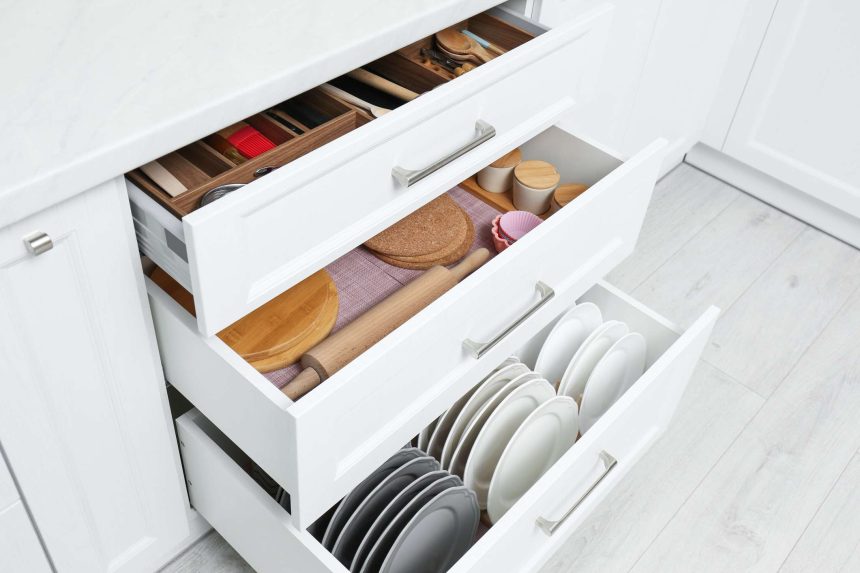Decluttering your kitchen not only frees up space, but it often makes your kitchen a lot easier to use too. But like any home project, kitchen decluttering requires a little prep work before getting started.
After all, even the golden rules of decluttering don’t always ensure that your space is organized according to your needs and the time you have on hand. So, we spoke with two kitchen experts to find out the six questions to ask yourself before decluttering the kitchen.
Where’s the Best Place to Start?
Take a few minutes to think about where you want to start the kitchen decluttering process before doing it—starting it in the wrong place could lead to getting overwhelmed, bored, or never actually finishing decluttering.
If you’re the type of person who needs a small win ASAP to stay motivated, start by decluttering an easy-to-finish space like under the sink or the junk drawer.
If you’d rather get the hardest parts out of the way first, begin your decluttering by conquering the pantry or hard-to-access cabinets on top of the fridge and microwave.
Want more cleaning and organizing tips? Sign up for our free daily newsletter for the latest hacks, expert advice, and more!
What Can You Declutter in the Time That You Have?
Another question to ask before getting started is how much you can expect to declutter in the time you have. Assuming you can declutter your entire kitchen in an hour or two will only lead to frustration.
Instead, aim to finish a few cabinets if you only have a few hours, or break it up into smaller parts by trying to declutter a cabinet or drawer in thirty minutes each day. Decluttering an entire kitchen will probably take about half a day.
Which Appliances Do You Really Need?
Appliances can be a major space-waster in kitchens when they’re rarely used.
“I find that the items that take up the most space are old kitchen appliances from the ’90s that are no longer used,” says Delah Gomasi, managing director of MaidForYou.
Review each small appliance you have and try to remember the last time it was used. If it’s been over a year—and it’s not an especially expensive or hard-to-find appliance—consider donating it. This goes for bulky single-use appliances like egg cookers too.
“I always recommend to my clients to buy all-in-one gadgets and then dispose of the individual items,” Gomasi says.
What’s Just Taking Up Space on the Counters?
Decluttering involves more than editing and auditing what’s in your cabinets and drawers—your countertops should be decluttered too. Kitchen counters will be so much more useful if they’re kept as clear as possible, aside from the necessities.
Taylor Riley, founder of Boom. Facility Service Advisors, answers this question by doing “a quick assessment of what I use frequently versus what’s just taking up space.”
Items that are used nearly every day, like coffee makers and dish racks, can be kept on the counters. But appliances that are only used weekly or monthly, like rice cookers or food processors, should be stored elsewhere.
What Food Do You Need?
Don’t forget to declutter the pantry. It can hide just as much clutter as your cabinets can, but the difference with pantry clutter is that it can lead to some nasty smells, spills, and even critter problems.
Review all the food you have stored away in your pantry or refrigerator and look for ingredients that have expired or are about to expire. Try to cook the soon-to-expire items ASAP and toss the expired food.
If you come across large amounts of the same item that will be hard to use in time (“Those dozen cans of tinned tomatoes, are you really going to use all of them?” Gomasi says), donate them to a food pantry instead.
How Can Your Kitchen Work Harder?
As you wind down any kitchen decluttering, think about how you use the space—and how you’d like to use it, too.
For example, would it be a lot easier to unload the dishwasher if the cabinets that were near it held all those frequently-used items that subsequently need to be washed often? Would weeknight cooking be simpler if pots and pans were kept next to the stove?
“Items you use daily—like seasonings or utensils—should have a designated spot near your prep area for quick access,” Riley says. “Less frequently used items, like large appliances, can go in cabinets or storage so they’re out of the way.”







